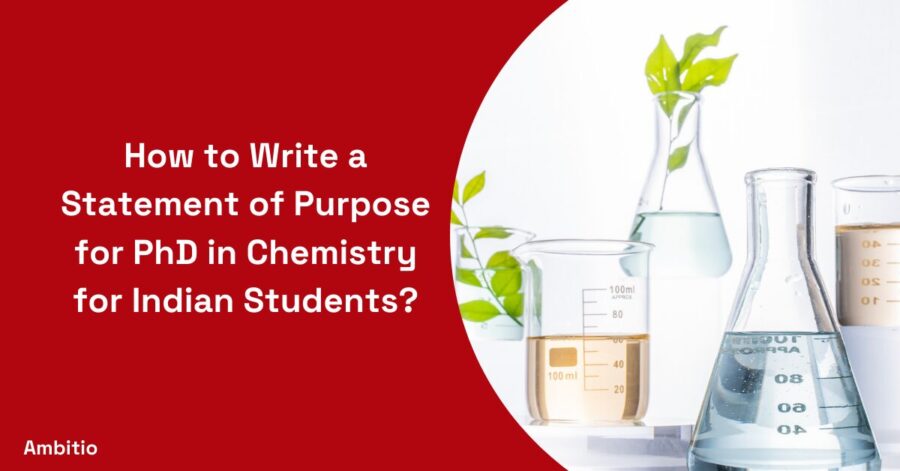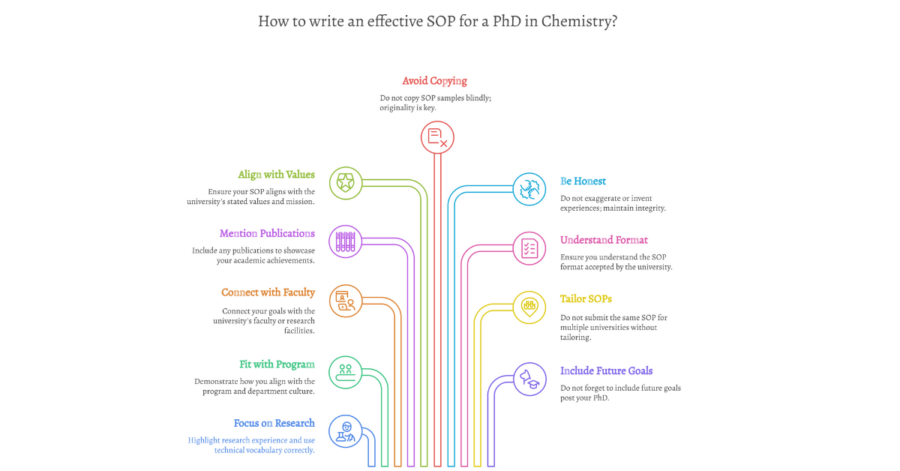5 May 2025
7 minutes read
How to Write a Statement of Purpose for PhD in Chemistry for Indian Students (Sample SOP for PhD in Chemistry)?

Key Takeaways
- Statement of Purpose for PhD in Chemistry must clearly reflect your research interest, academic background, and long-term goals.
- Statement of Purpose for PhD in Chemistry should highlight relevant research experience and show alignment with the chosen program.
- Statement of Purpose for PhD in Chemistry requires a focused, structured, and tailored approach to impress the admission committee.
Writing the ideal statement of purpose for PhD in chemistry may appear challenging, particularly if you are an Indian student planning to pursue your studies abroad. Perhaps you’re asking yourself how to differentiate yourself from the admission committee, or how to communicate your academic education, experience in research, and desire to make a valuable contribution to the chemistry field.
Composing your SOP for PhD is not a mere formality—it’s a turning point which makes you stand out from the applicant pool, explaining why you’re a good fit for the program.
In this guide, we’ll demystify everything from learning what a statement of purpose is to actual SOP samples, writing pointers, mistakes to avoid, and the top universities to pursue your PhD in organic chemistry, medicinal chemistry, or analytical chemistry.
From mass spectrometry to physical chemistry to organometallic chemistry, your SOP should showcase your research interest, chemistry lab experience, and future dreams. Let us begin with deciphering the basics.
What is a Statement of Purpose for PhD in Chemistry?
A statement of purpose for PhD is a brief academic essay that you send in with your PhD application, intended to tell the admission committee about yourself, your inspiration, your academic and professional background, and your area of interest in research.

This paper should emphasize your undergraduate education, chemistry degree, research project, and any applicable experience that has influenced your desire to obtain a PhD. Universities seek clarity of mind, dedication to the doctoral program, and how well your interests match the faculty and current research program.
Think of your SOP for Ph.D as your opportunity to talk directly to the reviewers about your journey and your passion. Your chemistry statement of purpose should reflect the exact purpose for a PhD, outlining your academic background, prior work in chemical processes, and your fit for the chemistry department. Your writing must remain professional while maintaining a touch of personality that makes your story unique.
How to Write an SOP for PhD in Chemistry?
Did you know that over 70% of SOPs get rejected simply because they lack clarity or personalization? When you write an SOP to pursue a PhD in Chemistry, you must create a structured, honest, and engaging narrative that links your past experiences with your future research goals.
Here are key elements to focus on:
- Start with a captivating introduction that reveals how your interest in chemistry as my major began.
- Discuss your academic background, particularly your bachelor’s degree in the field of chemistry and any internships or projects.
- Highlight your experience in research, especially in fields like heterocyclic chemistry, medicinal chemistry, or physical chemistry.
- Mention your research interest and how they align with the chemistry program you are applying to.
- Conclude with your dreams, showing how the doctoral program fits into your long-term goals as a researcher.
A compelling PhD SOP tells a story—it avoids fluff and showcases clear direction. Tailor your SOP to the particular program, and never use a one-size-fits-all approach.
What are Some SOP Writing Tips for Your PhD Application?
Fun fact: Some of the most successful SOPs include experiences from unexpected places, like volunteer work or high school science fairs. A well-written SOP connects these moments to your passion for chemistry research.

Use these tips to fine-tune your SOP:
- Show, don’t tell—back your passion with specific research or lab examples.
- Avoid repetition and tailor your SOP to each university.
- Mention your mentor, if any, and how their guidance shaped your journey.
- Reflect on failures or challenges and how they prepared you for a Ph.D journey.
- Proofread thoroughly or consider seeking help from professional SOP writers to ensure clarity and tone.
If you’re applying for a PhD in medicinal chemistry or a PhD in organic chemistry, show familiarity with recent studies or breakthrough research in that area.
What are Some Dos and Don’ts in Your Chemistry / Organic Chemistry PhD SOP?
Here’s something you might not know: Admission panels can skim through SOPs in under 4 minutes. That means clarity and structure are key in your chemistry PhD statement.
Here’s what you should do—and avoid:
DOs:
- Do focus on your research experience and use technical vocabulary correctly.
- Do demonstrate how you fit for the program and department culture.
- Do connect your goals with the university’s faculty or research facilities.
- Do mention your publications, if any.
- Do align your SOP with the university’s stated values and mission.

DON’Ts:
- Don’t copy SOP samples blindly; the admission committee can tell.
- Don’t exaggerate or invent experiences.
- Don’t write without understanding the SOP format accepted by the university.
- Don’t submit the same SOP for multiple universities without tailoring.
- Don’t forget to include future goals post your PhD.
PhD Statement of Purpose Sample
Below is a sample PhD statement of purpose to help students understand how to connect their journey, academic background, and aspirations.
Given below is a sample SOP for PhD in Chemistry submitted by an Indian student applying to a university abroad.
Organic Chemistry Statement of Purpose Sample for PhD
My name is Raghav Iyer, and I am applying for the Ph.D program in Chemistry at the University of Toronto. The department’s emphasis on analytical chemistry and cutting-edge mass spectrometry research aligns perfectly with my passion and career goals.
My interest in chemistry took shape during my high school years, influenced by the chemical interactions explored in daily life. I pursued a bachelor’s degree in chemistry at Delhi University, where I immersed myself in subjects like physical chemistry, organic chemistry, and chemical processes.
My final-year research project on organometallic chemistry under the mentorship of Dr. Meera Sinha sparked a lasting curiosity. Post-graduation, I interned at the Indian Institute of Chemical Technology, where I worked on a team investigating novel applications of heterocyclic chemistry in medicinal chemistry.
I later completed my Master’s at IIT Bombay, focusing on mass spectrometry techniques to analyze drug compound interactions. My decision to pursue a PhD stems from my desire to become a researcher who contributes to the development of more efficient, affordable, and safer pharmaceuticals.
The University of Toronto’s interdisciplinary chemistry program and strong faculty mentorship make it my ideal destination. Through your Ph.D program, I hope to gain the skills necessary for a long-term research career and become a contributing member of the academic and industrial chemistry community.
Do SOP Samples in PhD Chemistry Help You With Your Application?
Here’s a fun fact: Students who read 2–3 SOP samples before writing their own often produce stronger, more structured statements. But samples are tools—not templates.
Here’s how samples help:
- They show real examples of how to highlight your strengths.
- They clarify the SOP format expected by most international universities.
- They provide ideas for describing research experience creatively.
- They help students avoid clichés or overused phrases.
- They teach what a winning SOP looks like, especially in chemistry PhD programs.
Remember to always tailor your SOP, even if a sample SOP for PhD looks appealing.
What are Some Professional SOP Requirements to Structure Your SOP for a PhD?
Fun fact: Some universities use AI software to scan SOPs for structure and relevance before a human ever reads it. That’s why formatting matters.
Professional SOP structure must include:
- Introduction that shows your academic roots and personal passion for chemistry.
- Academic journey including your undergraduate studies, key subjects, and GPA.
- Research experience, especially lab work, internships, or thesis.
- Research interest and how they match the department’s current focus.
- Future plans and goals, including long-term research or teaching aspirations.
Stick to one page (800–1000 words) unless specified. Always follow university-specific SOP requirements.
Top 15 Best Study Abroad Destinations for a PhD in Organic Chemistry
Did you know that the UK and USA together house over 50% of the world’s top chemistry Ph.D programs? Students applying to study abroad often look for quality, affordability, and research opportunities.

Here are top destinations offering elite PhD in organic chemistry programs:
| Sl. No. | Country | University | Fee (per year approx.) | Programs Offered |
|---|---|---|---|---|
| 1 | USA | MIT | $53,790 | Organic, Analytical, Physical Chemistry |
| 2 | USA | Stanford | $55,473 | Chemistry Ph.D Program |
| 3 | USA | Harvard | $50,928 | Chemical Biology, Medicinal Chemistry |
| 4 | USA | UC Berkeley | $45,000 | Organic and Inorganic Chemistry |
| 5 | UK | University of Oxford | £25,900 | DPhil in Organic Chemistry |
| 6 | UK | University of Cambridge | £27,285 | Ph.D Chemistry |
| 7 | UK | Imperial College London | £31,750 | Ph.D in Medicinal Chemistry |
| 8 | Canada | University of Toronto | CAD 24,000 | Ph.D Chemistry Program |
| 9 | Canada | University of British Columbia | CAD 22,000 | Ph.D in Organic Chemistry |
| 10 | Canada | McGill University | CAD 20,000 | Chemistry Graduate Program |
| 11 | Australia | University of Melbourne | AUD 45,000 | Ph.D in Chemical Sciences |
| 12 | Australia | Australian National University | AUD 41,280 | Ph.D Chemistry |
| 13 | Australia | University of Sydney | AUD 47,500 | Ph.D in Organic Chemistry |
| 14 | USA | Caltech | $54,600 | Organic and Organometallic Chemistry |
| 15 | UK | University College London | £29,220 | Ph.D Chemistry |
Conclusion
Writing a compelling statement of purpose for PhD takes clarity, sincerity, and direction. It’s more than just a requirement for your PhD application—it’s your pitch to a future that revolves around scientific inquiry and innovation.
Whether you are passionate about medicinal chemistry, analytical chemistry, or even chemical processes in general, your SOP for PhD in chemistry must tie together your academic background, research experience, and your goals to pursue a PhD in a meaningful way. We’ve covered what a PhD SOP is, how to structure it, common mistakes, and what makes a perfect SOP.
You’ve also seen a sample SOP for PhD, understood how SOP samples can help you, and discovered top international destinations where you can launch your research career. Use these insights to write an SOP for PhD that is clear, honest, and aligned with your Ph.D ambitions.
Remember, a winning SOP is not just about impressive jargon—it’s about communicating why a PhD is the right step for you and why you’re the strong candidate for the program. Schedule a call with the study abroad experts at Ambitio now and make your dreams come true!
FAQs
What is a Statement of Purpose for PhD in Chemistry?
A Statement of Purpose for PhD in Chemistry is a written document that explains your motivation, academic background, and research goals. The Statement of Purpose for PhD in Chemistry helps the admission committee evaluate your suitability for the doctoral program.
How long should a Statement of Purpose for PhD in Chemistry be?
A Statement of Purpose for PhD in Chemistry is typically between 500 to 1,000 words. A concise yet detailed Statement of Purpose for PhD in Chemistry ensures clarity and demonstrates your focus to the admission committee.
What should I include in my Statement of Purpose for PhD in Chemistry?
Your Statement of Purpose for PhD in Chemistry must include your academic background, research experience, and future research interest. The Statement of Purpose for PhD in Chemistry should also show how you are a strong candidate for the program.
Why is research experience important in a Statement of Purpose for PhD in Chemistry?
Research experience strengthens your Statement of Purpose for PhD in Chemistry by showing hands-on skills and knowledge in the field. Most successful Statements of Purpose for PhD in Chemistry include detailed accounts of your research project and methodologies used.
Can I use a Statement of Purpose sample for PhD in Chemistry?
Yes, using a Statement of Purpose sample for PhD in Chemistry can help guide your writing and structure. A Statement of Purpose sample for PhD in Chemistry offers inspiration but must be personalized to reflect your own journey and research interest.
How do I tailor my Statement of Purpose for PhD in Chemistry to a specific university?
To tailor your Statement of Purpose for PhD in Chemistry, mention specific faculty, labs, or programs of interest at that university. Customizing your Statement of Purpose for PhD in Chemistry makes it more relevant and appealing to the program’s goals.
What mistakes should I avoid in my Statement of Purpose for PhD in Chemistry?
Avoid vague goals, generic statements, and grammatical errors in your Statement of Purpose for PhD in Chemistry. A well-written Statement of Purpose for PhD in Chemistry avoids repetition and presents a focused academic and professional narrative.

You can study at top universities worldwide!
Get expert tips and tricks to get into top universities with a free expert session.
Book Your Free 30-Minute Session Now! Book a call now




























